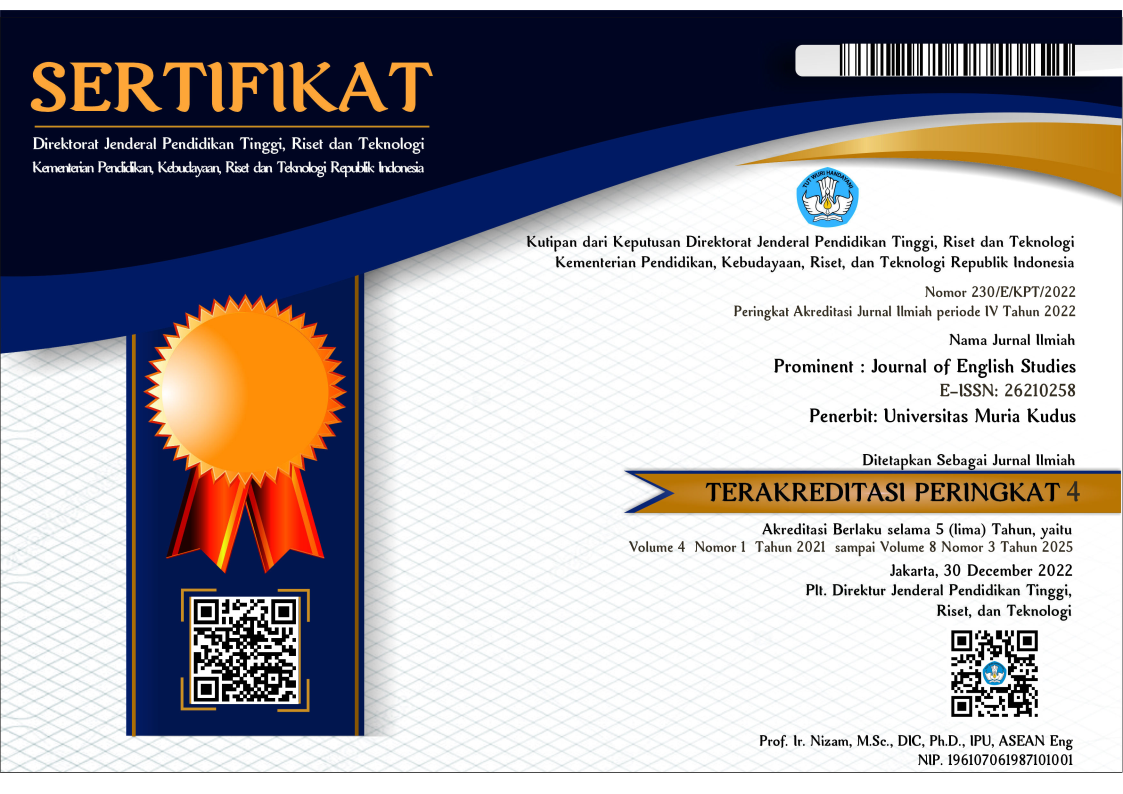BOTTOM-UP AND TOP-DOWN LISTENING PROCESSES WITHIN COGNITIVE CONSTRUCTIVIST LEARNING THEORY
Abstract
The attention in Listening processes has switched from the text to the listener, from the process of identification to the process of understanding, and from the decontextualized memorization of definitions to developing language competence of students. This conception is then supported by the theory of congnitive constructivism which sees learning as the process of constructing new knowledge. This paper aims to explore activities which can be applied to develop listening language skills in a context of authentic learning within constructivist learning approach. The learning activity will be based on the features of constructivism which views learning as an active process and knowledge is not absorbed passively but it is invented by the learners. By integrating the top-down and bottom-up listening processes and cognitive constructifist learning activities, this process will facilitate students in elaborating their previous knowledge and constructing new knowledge.
Full Text:
PDFReferences
References
Aljohani, Muna. (2017) Principles of “Constructivism” in Foreign Language Teaching. Journal of Literature and Art Studies. 7, (1), 97-107
Guixia, Song (2016) Constructivism in Audiovisual and Speaking Teaching of University. Higher Education of Social Science, 10 (2), 1-5
Gul, A. (2016). Constructivism as a new notion in English language education in Turkey (A dissertation submitted to the Kent State University College of Education, Health, and Human Services in partial fulfillment of the requirements for the degree of Doctor of Philosophy, Kent University)
Hoover, W. A. (1996). The practice implications of constructivism. SEDLetter 9, (3).
Kim, Jong Suk. (2005) The Effects of a Constructivist Teaching Approach on Student Academic Achievement, Self-concept, and Learning Strategies. Asia Pacific Education Review. 6,( 1), 7-19.
McLeod, Saul. (2018) Jean Peaget’s Theory of Cognitive Development. https://www.simplypsychology.org/piaget.html (accessed at 10 Descember 2018)
Mvududu, Nyaradzo & Burgess, Jennifer Thiel (2012) Constructivism in Practice: The Case for English Language Learners. International Journal of Education 4, (3), 108-119
Olesegum, Steve. (2015). Constructivism Learning Theory: A Paradigm for Teaching and Learning. IOSR Journal of Research & Method in Education. 5 (6), 66-70
Phillips, D. C. (2000). Constructivism in education: Opinions and second opinions on controversial issues. Chicago: Ninety-Ninth Yearbook of the National Society for the study of Education, Part I.
Piaget, J., & Inhelder, B. (1969). The psychology of the child. New York: Basic Books.
Rexhaj, Xhavit (2016) Constructivist Approach and Srategies for Improving the Listening language Skill. Thesis. https://dspace.aab-edu.net/.../01-2016-EN-03-Xhavit-Rexhaj accessed at 20 Maret 2018
Richards, Jack C. (2008). Teaching Listening and Speaking: From Theory to Practice. New York: Cambridge University Press
Sharma, Hemant Lata & Poonam (2016) Constructivist Approach for Teaching English: Making Sense of Paradigm Shift from the Traditional Approach. International Journal of Science and Research, 5, 788-792
Topolovčan, Tomislav and Matijević, Milan. (2017). Critical Thinking as a Dimension of Constructivist Learning: Some of the Characteristics of Students of Lower Secondary Education in Croatia. C.E.P.S. Journal. 7 (3), 47-67
Vygotsky, L. (1978). Interaction between learning and development.Readings on the development of children, 23(3), 34-41.
DOI: https://doi.org/10.24176/pro.v2i1.2962
Refbacks
- There are currently no refbacks.
Prominent Journal of English Studies is licensed under a Creative Commons Attribution-ShareAlike 4.0 International License.
Dedicated to:

in Collaboration with APSPBI:






